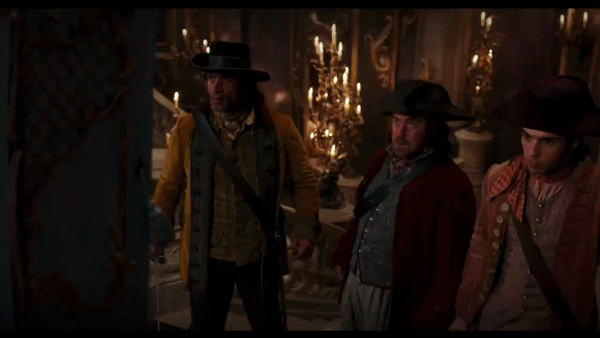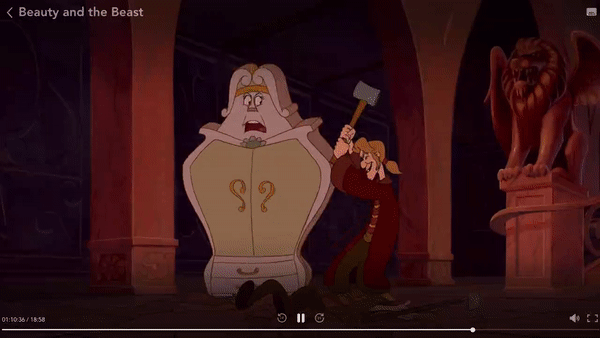|
I don’t know how I came across it, but a few days ago I saw an advertisement for a new Disney/Pixar film called Luca. Normally, I don’t give these ads a second glance; but this one caught my attention. The image was of the two main characters, Luca and his friend Alberto, riding awfully close to one another on a Vespa. What initially jumped into my mind was, “is Disney making a homosexual main character?” In recent years, Disney has slowly introduced homosexual characters and homoerotic behavior. For instance, consider this scene from the 2017 live action reimaging of Beauty and the Beast. Cross dressing as comedic farce is not uncommon and not something that necessarily raises a red flag. The concern is the clear transvestite glee in that man’s face as the wardrobe dresses him in pink. The way he saunters off drives the point home when you compare this to the same scene from the 1991 animated version: The comedy is clear because the transformation is both ridiculous and unwelcomed by the character. Let’s say you have a hard time seeing this cross dressing scene as normalizing gender dysphoria (or if you do and you agree, then I’m surprised you’re still with me.) A couple of years later, Disney came out with Star Wars: Episode IX - The Rise of Skywalker. I am a big fan of the original Star Wars films. They are far better than the Star Trek series, especially since the latter is known for its progressivist agenda. I also enjoyed Disney’s franchising of the Star Wars universe, even enjoying The Rise of Skywalker. That is, up until the point of this very brief but very clear scene: The two characters in this shot are the female commanding officer of the Rebel fleet and a female pilot.
At this point it may seem like I am calling these people “monsters.” That is not the case. Homosexuality and gender dysphoria are real and they are real experiences people have. They are also very real sins, just like any other sin. All sins are monstrous, but that does not make the sinner a monster. The reason I highlight these two examples is to allow you a glimpse into my frame of mind when I first came across that advert for Luca. I sincerely thought Disney had finally gone off the deep end. I don’t think that is the case... yet. According to director Enrico Casarosa, the friendship between the main characters is strictly platonic, stating his team stuck with prepubescent teens for a reason. Mr. Casarosa does comment that a similar narrative was released earlier, though that was mere coincidental and bore no influence on Luca; however, of that director he comments, “I love Luca’s movies and he’s such a talent...” The movie in question is Call Me By Your Name which is a “coming-of-age/coming-out drama, which centered around a 17-year-old American finding romance with an older man in the picturesque Italian countryside.” I want to take Mr. Casarosa at his word, as I try to do for all people, but it’s hard when his word also includes admiration for a director whose films attempt to legitimize homosexual behavior. Until Luca is available for viewing and reviewing, I’ll leave that conversation there. Nevertheless, this film still poses some problems for Christians and must be approached with a biblical worldview. According to Camille Jefferson, a Disney News Contributor, “this movie’s message about acceptance — for yourself, as well as others — is a valuable one, particularly in current times.” I don’t want to put words in Ms. Jefferson’s mouth, but “current times” certainly carries the notion of the current sexual revolution. But, since she doesn’t go there, I won’t either. But what she does say troubles me. Quoting producer Andrea Warren, “We always liked the idea that the metaphor of being a sea monster can apply to so many different things. There is a theme of openness, showing oneself and self-acceptance, as well as community acceptance. Confronting the idea that there's more to sea monsters than they realized. You know that they've only seen it through one perspective, one lens, and so I think that that's a wonderful theme in the film, which is that those ideas weren't right and that there's more to learn.” This is the unfortunate trend at Disney, redefining monsters, and it is something that can take Christians off their guard. To be fair, sea monsters are fictional, so a writer can do whatever he wants with them. Even so, throughout literary history, they’ve always represented danger, wickedness, or notoriety. I guess that’s the “one perspective, one lens” Ms. Warren is talking about. Why does Disney feel the need to redefine monsters? H. G. Wells, the brothers Grimm, Bram Stoker, and many others never did! Why do monsters need defending? The only reason I can see is because Disney and others like it want to blur the lines between righteousness and unrighteousness. And the next thing that comes to my mind is Isaiah 5:20-21, “Woe to those who call evil good, and good evil; who substitute darkness for light and light for darkness; who substitute bitter for sweet and sweet for bitter! Woe to those who are wise in their own eyes and clever in their own sight!” This new philosophy of self-acceptance is the age-old error of autonomy. Literally, autonomy means “self law.” This is the modern mantra: If my experience is the measure of reality, then my reality (whether fictional or not) must be accepted as truth. This philosophy of self-acceptance runs contrary to the doctrine of true knowledge. Calvin famously wrote, “true and sound wisdom consists almost entirely of two parts: the knowledge of God and of ourselves.” He concluded that a right knowledge of God is necessary for right knowledge of ourselves. And in light of God’s self-revelation, we see that “self-acceptance” is essentially the same sin “every man did what was right in his own eyes” (Jg. 17:6). If there is anything so monstrous and abominable to God, it’s man’s self-righteousness, which is another way of describing “self-acceptance.” We see this self-righteousness rise to the surface when later in her article, Ms. Jefferson reports she asked Mr. Casarosa about an important takeaway from Luca. He responded, “The most important thing was to remember not to listen to the voices that say you can’t.” Oh, you mean like the voice which says “Thou Shalt Not...?”
0 Comments
Your comment will be posted after it is approved.
Leave a Reply. |




